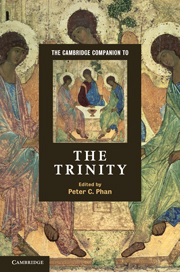Book contents
- Frontmatter
- Contents
- Notes on contributors
- Preface
- Part I Introduction
- Part II Retrieving the sources
- Part III Renewing the tradition
- 6 God as the mystery of sharing and shared love: Thomas Aquinas on the Trinity
- 7 The Trinity in Bonaventure
- 8 The Trinity in the Protestant Reformation: continuity within discontinuity
- 9 Between history and speculation: Christian trinitarian thinking after the Reformation
- Part IV Contemporary theologians
- Part V In dialogue with other religions
- Part VI Systematic connections
- Index
- References
7 - The Trinity in Bonaventure
from Part III - Renewing the tradition
Published online by Cambridge University Press: 28 July 2011
- Frontmatter
- Contents
- Notes on contributors
- Preface
- Part I Introduction
- Part II Retrieving the sources
- Part III Renewing the tradition
- 6 God as the mystery of sharing and shared love: Thomas Aquinas on the Trinity
- 7 The Trinity in Bonaventure
- 8 The Trinity in the Protestant Reformation: continuity within discontinuity
- 9 Between history and speculation: Christian trinitarian thinking after the Reformation
- Part IV Contemporary theologians
- Part V In dialogue with other religions
- Part VI Systematic connections
- Index
- References
Summary
From 1248 to 1257, Bonaventure of Bagnoregio (1217–1274) taught theology at the University of Paris, offering courses on Peter Lombard's Sententiae in IV libris diotinctae (commonly known as the Sentences). His lectures eventually became the four-volume Commentarium in libros sententiarum (Commentary on the Books of Sentences), a critical edition of which was published by the Collegium S. Bonaventurae. In 1257, when he was elected Minister General of the Franciscan Order, his university teaching career for all practical purposes came to an end.
textual, contextual, and hermeneutical issues
Several preliminary hermeneutical issues need to be considered to assure a correct reading of Bonaventure's texts on the Trinity. Each issue has major implications for interpreting Bonaventure's theological works. From 1900 on, numerous publications on the theology of Bonaventure were published. Because they propose differing interpretations of Bonaventure's theology and exert varying degrees of influence, let us begin by considering the major contextual and hermeneutical issues involved in the interpretation of Bonaventure's theology.
- Type
- Chapter
- Information
- The Cambridge Companion to the Trinity , pp. 108 - 127Publisher: Cambridge University PressPrint publication year: 2011
References
- 1
- Cited by



